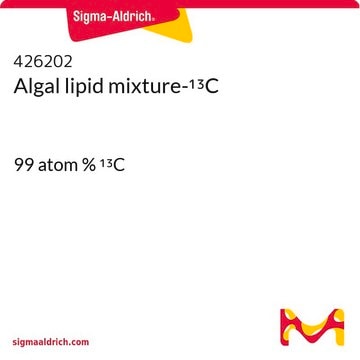T1395
(±)-α-Lipoic acid
suitable for cell culture, BioReagent, ≥99%
Synonyme(s) :
Thioctic acid, (±)-1,2-Dithiolane-3-pentanoic acid, 6,8-Dithiooctanoic acid, DL-α-Lipoic acid, DL-6,8-Thioctic acid, Lip(S2)
About This Item
Produits recommandés
Gamme de produits
BioReagent
Niveau de qualité
Pureté
≥99%
Technique(s)
cell culture | mammalian: suitable
Solubilité
ethanol: 50 mg/mL
Chaîne SMILES
OC(=O)CCCCC1CCSS1
InChI
1S/C8H14O2S2/c9-8(10)4-2-1-3-7-5-6-11-12-7/h7H,1-6H2,(H,9,10)
Clé InChI
AGBQKNBQESQNJD-UHFFFAOYSA-N
Informations sur le gène
human ... ACHE(43) , BCHE(590)
rat ... Adra1a(29412) , Adra1b(24173) , Adra1d(29413)
Vous recherchez des produits similaires ? Visite Guide de comparaison des produits
Description générale
Application
- for induction of eryptosis in erythrocytes
- as a constituent in NS21 media for neuronal cultures
- to evaluate its effect on liver energy metabolism by high performance liquid chromatography (HPLC) and assessing mitochondrial function by mitochondrial gene expression studies in lipopolysaccharide (LPS) pre-treated mice
- to elucidate its effect on paraquat poisoning in lungs
Actions biochimiques/physiologiques
Autres remarques
Mention d'avertissement
Warning
Mentions de danger
Conseils de prudence
Classification des risques
Acute Tox. 4 Oral - Aquatic Chronic 2 - Eye Irrit. 2 - Skin Irrit. 2 - Skin Sens. 1
Code de la classe de stockage
11 - Combustible Solids
Classe de danger pour l'eau (WGK)
WGK 2
Point d'éclair (°F)
Not applicable
Point d'éclair (°C)
Not applicable
Équipement de protection individuelle
dust mask type N95 (US), Eyeshields, Gloves
Certificats d'analyse (COA)
Recherchez un Certificats d'analyse (COA) en saisissant le numéro de lot du produit. Les numéros de lot figurent sur l'étiquette du produit après les mots "Lot" ou "Batch".
Déjà en possession de ce produit ?
Retrouvez la documentation relative aux produits que vous avez récemment achetés dans la Bibliothèque de documents.
Les clients ont également consulté
Notre équipe de scientifiques dispose d'une expérience dans tous les secteurs de la recherche, notamment en sciences de la vie, science des matériaux, synthèse chimique, chromatographie, analyse et dans de nombreux autres domaines..
Contacter notre Service technique












